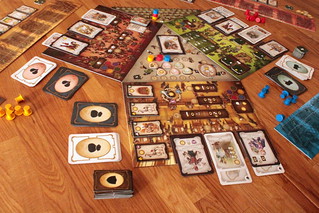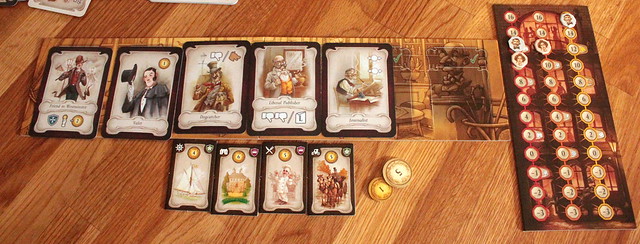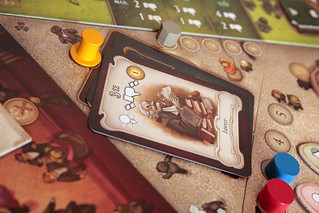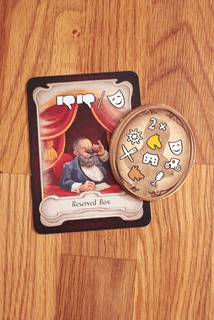| Strategy | Luck |
|---|---|
| Interaction | Components & Design |
| Complexity | Score |
The Prodigals Club is one of those games that overwhelm you with components the first time you open it, but after a spot of panic turn out quite accessible. All those components are split between three competition modules, any two of which are used in a regular game, all three together only in the long game. Your goal in all competitions is to ruin yourself. For the Society competition, that means you want to make important people despise you as much as you can. For the Election competition, it means that any vote you get at the end is one vote too many. And if you leave the Possessions competition with anything more than the underpants you’re wearing, you’ve been doing it wrong.

Each competition comes with its own board, decks of cards and its own extra components. On each competition there are spots to place your errand boys to run errands for you. Buying cards is an option in all competitions, giving you black cards that stay with you and can be used every round and white cards that you play once for their effect. All competitions also have special errands that only make sense in that competition.The general flow is that players take turn sending out an errand boy until they all used all their boys – classic worker placement – and then play all the cards they want to play for this round. The competitions are mostly independent from each other, that’s why you can combine any two of them without any trouble. But there are two things tying the competition together: the central board and the symbols mechanic. The central game board lets you change the player order and buy a few cards that apply to all contests. Important, but not game defining. The fun is in the symbols that you can collect in all three contests and that improve the actions you can take everywhere.
Lets look at the Possessions contest first, because losing money is something we’re all familiar with. You will start the game with a certain amount of money that you’ll want to get rid off. You’ll also start the game with a number of possessions – horses, cars, boats, mansions, and so on – that you will want to sell for money. You don’t have to sell them, but any possessions you still own at the end of the game are worth more than their sales price during the game, so to have the least money you want to be free of them. Symbols in this contest come from possessions, meaning that you start out with many of them and slowly get rid of them as you sell your possessions. You use the symbols in this contest to spend money, for instance you might play a card that lets you spend one coin for each champagne glass you currently have. To use this kind of card to its best effect you are not dependent on the symbols you have from the start. Besides selling your possessions you can also exchange them for less valuable possessions from the general supply and collect the symbols you need in the process.
Next, there is the Election contest. You start this contest with a lot of votes that your family already bought, and you want to convince every last person in your borough that voting for you would be slightly worse than a meteor strike. You start this contest with no symbols and collect more as the game progresses. Some actions let you take Political Circle tiles that give you symbols to use when you place two tiles with the same symbol next to each other. You use symbols in this contest to lose more votes, of course. This contest has the special mechanic of Megaphones, representing you standing on a soap box in Hyde Park and spouting the worst drivel you can think of to convince the voters of your unsuitability for office. The more nonsense you yell compared to the other players – the more Megaphones you play in a round – the more votes you will lose. The player with the least Megaphones actually gains a vote for being the least bad choice.

Finally, there is the Society competition. You have four people to piss off here, marked by four markers on your personal society board. That board has three columns of numbered spaces and actions here let you move markers downwards, sometimes straight, sometimes diagonally, which is important because no two markers can occupy the same space. Some spaces are marked with the coveted symbols that you gain as soon as a marker enters that space but lose again when you move that marker away. The symbols here are the most ephemeral, often gained and lost on the same turn, making timing a key consideration to do not at all well here. An important role in the Society competition falls to Dame Beatrice, a kindly old lady that constantly extols your virtues to everyone else. Before each round, a Dame Beatrice tile is revealed showing which society markers will move upwards at the end of this round. It might be all markers in the right columns, or all markers that share a row with at least one other marker, or something suchlike. Whichever it is, you generally want to move your markers out of the danger zone because it would be a shame to be a giant ass to everyone only for Dame Beatrice to convince them you didn’t mean it. One player can take the action to annoy the Dame herself so she won’t have a good word about him this round, all the others will just have to avoid her consequences.
All these competitions to do badly sound frivolous and some readers might even be reminded of Go for Broke!, a game that was pretty well known in its Milton Bradley edition and amounted to a dumbed down reverse Monopoly: players start with a lot of money and then roll-and-move around the board to lose it as quick as they can in casinos or the stock market. But nothing could be further from the truth. The Prodigals Club shares the theme of driving yourself to ruin. But despite aiming for the fewest points instead of the most it is a very clever, strategic game.

First of all, there are three competitions here instead of one, and a player’s final score is the highest score he has in any contest, to win you’ll have to carefully balance your efforts in all two or three contests. After all, what good is being completely broke if everyone loves you and you just got elected into a lucrative government job. Second, each contest offers many options, especially with available cards. All of them are useful in specific situations, but you mostly take them in bundles, and which bundle is the most useful for you is often not at all obvious. Or maybe you want to buy the one card from the central board, because the cards from there are the only ones affecting more than one contest – but you only get that single card, everywhere else you get more for your errand boys.
Third, and this is the part that really makes The Prodigals Club work, there are the symbols that not only tie the contests together but open the doors to some clever combo play and make the order of your actions so important. For example, one one turn you might lose one vote for every Mansion in your symbol collection, then exchange your last Mansion possession for a Horse, losing a bit of money in the process, then run around an important soiree telling everyone your horses are the best, so you lose Society points for every Horse, and that lose then lands one of your markers on a Boat symbol, so when you lose votes for Boats next you lose one vote more than if you had done this in any other way. Sorry if that explanation ran on a bit, but coming up with this sort of chain is very rewarding, even more so when you mix in some cards that you bought three rounds earlier and have been preparing for ever since.

There is one thing about The Prodigals Club that we were not able to test, and that is mixing it up with Last Will, another game about losing all your possessions by designer Vladimír Suchý that can replace the Possessions contest in this game. The reason we didn’t test that is simple, we don’t have a copy of Last Will around the Meeple Cave. If you have tried both games together, it’d be awesome if you could leave a comment how well they work together.
But outside of that one aspect we know nothing about, The Prodigals Club is a wonderful game with many tactical and strategic options, one of those games where every decision has an impact. The three different contests sound a bit like a jumble of unrelated things at first, but the symbols do a great job of binding them together and make actions in one contest important for the others. Between the three possible games with two contests and the full game with all three, we didn’t find any combination that was weak, they all work together flawlessly. The only two points of criticism we can level at The Prodigals Club, really, are that is doesn’t work as well in two players as we’d wish and that it’s a bit of a chore to set up with all those different card decks that have to go to the right places and be put in the right order.













